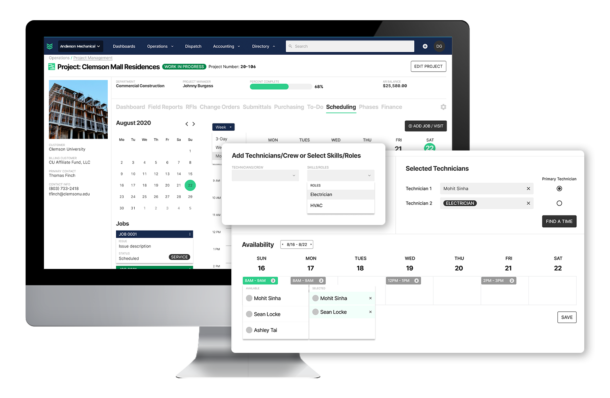Commercial contractors in the mechanical, electrical and plumbing industry have been challenged by a shortage of skilled labor for several years. In the last 18 months, a perfect storm of unprecedented circumstances — among them are COVID-19, materials shortages, materials price increases and supply chain interruptions — has exacerbated the labor gap and pushed our industry into an ongoing state of crisis.
In addition to revealing deep structural vulnerabilities, the unforeseen difficulties of 2020 and 2021 have underscored the urgent need for commercial contractors to implement new efficiency strategies and processes in order to stay competitive. It’s more critical than ever that they find ways for their teams to operate more effectively and maximize productivity in order to shore up profit margins.
One of the top priorities throughout the industry is reducing the amount of time that team members spend on tedious, time-consuming tasks, freeing them to do the meaningful service work for which they’re trained and hired.
The specific needs of every contractor are different, depending on their company’s size, location, specialized focus and long-term goals. Nevertheless, a few proven strategies for streamlining and building efficiency apply throughout our industry and can, if implemented intentionally, make a noticeable difference in operations and show results for almost any contracting business.
Improve communication
Sounds easy, right? But teams working on commercial mechanical, electrical and plumbing projects face a host of obstacles to efficient communication. For contractors, maintaining effective open channels between jobsites and the office is a major ongoing challenge that creates friction and slows productivity. And since time is money, one of the simplest ways to increase profitability is get your communication processes down pat.
We know that an array of technology solutions are available to help field techs save time, reduce expenses, and generate more revenue. But they aren’t the only team members who can benefit from technology. Contractors whose technology investment is limited to an app for technicians could be missing a significant opportunity to increase their company’s productivity across the board.
Office staff plays a critical support role that makes field service calls possible. From scheduling and dispatch to sales, management and accounting, empowering the behind-the-scenes team to perform more efficiently and effectively is an essential component of any strategy for increasing revenue and supporting growth.
On top of that, the sheer number of stakeholders involved in a commercial project can complicate the flow of information, increasing the risk of delays, inaccuracy and cost overruns. Integrating an all-in-one system that connects field technicians, back-office staff, account managers, finance and accounting teams, owners, and customers fosters transparency and accountability, encourages faster decision-making and reduces errors, which all adds up to completing more jobs and staying under budget.
The best all-in-one operational software solutions for modern commercial contractors can help the average company save several hours of work a week, giving you and your team more time to focus on growth and increasing revenue opportunities.

Streamline workflows
Guided and gated workflows help contractors develop standardized approaches for their field service teams for a variety of jobs and conditions. These automated workflows and associated benchmarks for performance contribute to operational efficiency across the board: techs can provide real-time information about every job at multiple points, building an internal knowledge base and full work history for each client.
Successful contractors are juggling multiple projects simultaneously. That can be difficult enough to manage, especially if you rely on manual processes. This can result in resource capacity shortages, scheduling conflicts, and missed deadlines. Pen and paper are dead; operational software can completely change the way your company gets work done. With software, all the essential information is organized in one place – all relevant data and information are just a few clicks away in one database that acts as your “single source of truth.”
With the right HVAC software in place, you can automate your operational processes, freeing up your employees to tackle more productive (and more lucrative) projects. For example, automated reporting makes it easy to measure productivity across the board, shining a spotlight on potential areas for improvement, while smart task lists and work queues make daily work prioritization a snap, so everyone can get right to work on the tasks that matter most. With project status always available at everyone’s fingertips, nobody wastes time manually checking on progress or sitting in meetings that are a waste of time.
Advanced field service management software provides sophisticated built-in automation for various tasks, including smart scheduling and dispatching, workforce and resource planning, live updates on field team status, and more. Integrated features combine quoting and invoicing, workflow management, asset tracking, and customer management, which allow for total visibility at a glance.
Crucially, these workflows enable the collection and analysis of critical job and customer data that empowers contractors to deliver best-in-class customer service and optimize operational efficiency.
Measure performance
Collecting data is the first step to making smart business decisions. Having the right data organized and accessible can supercharge a team’s productivity by providing key information about where your business stands in terms of costs, revenue, efficiencies, bottlenecks, and more so you can see how your crew is performing, which job types bring in the highest profit, and key areas for development (aka: your weakest link).
The top all-in-one platforms for our industry are designed to manage all your operations and deliver actionable data collected from all departments, customers, employees, and projects. All of this information is available in real-time, offering up-to-the-minute insights into any and all aspects of your business. There are endless possibilities for fast, accurate, accessible data and analysis that can improve performance and drive increased revenue and growth.
Using a reliable reporting system, commercial contractors can collect and understand the data they need to optimize their operational efficacy and ideally reach operational excellence. With in-depth insights into quotes, events, revenue, time, and maintenance, contractors can effectively identify bottlenecks and other issues. From there, they can take the necessary steps to eliminate those issues and get the most from their operations.
You hire your teams for their skill and experience. Every second they spend filling out paperwork or performing tedious data-entry tasks is a second when their value isn’t being realized. That’s frustrating for them — and expensive for you, especially during the current challenging economic climate. Reducing the amount of time that team members spend on tedious, time-consuming tasks and freeing them to do the meaningful service work they’re trained and hired for can distinguish the top service companies and position them for continued growth and success. The goal here is to achieve increased team morale, higher profit margins, and for business owners, a greater sense of confidence in scaling the business.
 Author Bio: Alok Chanani is an entrepreneur who spent nearly a decade as the Founder/CEO of USA Commercial, a construction company that built apartment buildings in major cities across the US. During this time, Alok realized how innovative technology could change the lives of the specialty contractors he was working with and inspired him to launch an incredibly modern, robust software solution (what BuildOps is today). A former U.S. Army Captain, Alok served as an infantry platoon leader, combat engineer, and Unit Commander in Baghdad – spending a year moving large amounts of currency around Iraq. Alok has a BS from Cornell University, and an MBA in real estate from the Wharton School.
Author Bio: Alok Chanani is an entrepreneur who spent nearly a decade as the Founder/CEO of USA Commercial, a construction company that built apartment buildings in major cities across the US. During this time, Alok realized how innovative technology could change the lives of the specialty contractors he was working with and inspired him to launch an incredibly modern, robust software solution (what BuildOps is today). A former U.S. Army Captain, Alok served as an infantry platoon leader, combat engineer, and Unit Commander in Baghdad – spending a year moving large amounts of currency around Iraq. Alok has a BS from Cornell University, and an MBA in real estate from the Wharton School.




Join the conversation: